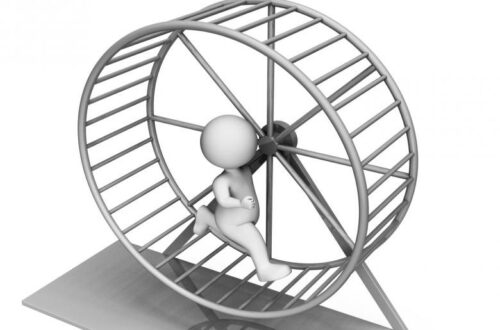
Do you want what you wish?
“You don’t have to learn to want,” said Greek philosopher Seneca. And indeed, we humans seem very good at wanting. We want all kinds of things. And there are things we don’t want. We want more. And when we have what we want, we want something else. Wanting seems to come to us very naturally. Still, wanting is not as easy as it seems. Let’s take a closer look at that will of ours.
In everyday life we use the word ‘want’ very often, but in many cases what we are actually expressing is a wish. Wishing for something is not the same as wanting something. Wishing for something means that you would like to do something, or that you would like to see that a situation was different. Wanting something means that you actually want to realize that wish. German philosopher Peter Bieri points out that although we have all kinds of wishes, they do not all become a will. “To become a will,” says Bieri, “it must set us in motion.”
In other words: You can want (or better: wish for) all kinds of things, but if you are not willing to actually do something for it, to take the necessary steps to realize your wish, then you cannot really speak of a real will. (Some people think that you just have to want something and it will happen. That’s nonsense; things don’t happen just because you want to, you have to do something for it.) According to Bieri, wanting is therefore “an interplay of wish, conviction, deliberation and willingness.” A wish is non-committal, a will requires commitment. A commitment to really get moving and realize your wish. Or at least give it a try.
The fact that you want something always means that something is missing or that something is not the way you want it. The German philosopher Friedrich Nietzsche has articulated that in an interesting way. Wanting, he says, contains two aspects: “the state from where” and “the state where to.” You always want something that is not there yet or what you don’t have now. So you are dissatisfied with how it is now. After all, if you were satisfied, there would be nothing left to want.
The Dutch philosopher (and self-appointed pessimist) Menno de Bree puts it a little differently. According to him, wanting indicates a defect, a shortage. “If I want something”, says De Bree, “that is a sign of a shortage: the way it is now is not good enough.” The annoying thing is: that shortage will never be solved. Like I said: We want all kinds of things and a soon as we have what we want, we want something else. That is ingrained in human nature.
Still, I find De Bree’s approach a bit too negative. After all, wanting something not only implies that you are dissatisfied with the current situation, but also contains a positive aspect, namely that what you want: the appealing perspective of what you want to have or realize. Go on that beautiful trip, attend a concert by your favorite band, learn to speak a language, or just spend an evening quietly with a good book on the couch.
A wish is non-committal, a will requires commitment. A commitment to really get moving and realize your wish. Or at least give it a try.
That brings me to another point. It may be that you don’t have to learn to want, but having a clear idea of what it is you want is a completely different story. Many people don’t know what they want at all. Or they do know what they want, but have no idea why (“I just want that.”) And I don’t just mean choosing the color of a new car or deciding on what to have for dinner tonight, but more fundamentally: what you want in life. “It’s amazingly difficult to know what you want,” acknowledges philosopher Bieri (which I find kind of reassuring). In addition, there are three common problems with what we want:
First: Not everything you want is sensible. Just think of it, there are probably things that you wanted in the past and then did, and that made you think afterwards: “Maybe I shouldn’t have done that…” That is why Menno de Bree warns against the frequently heard adage “You should do what you want.” That is not sensible, he says: “If I am supposed to do what I want, I assume that what I want is also good, but it is not always the case.”
I think De Bree is right about that. Doing what you want is not always a sensible attitude in life. Some of the things you want may not be good for you (or for others), or they don’t bring you what you expect from them, or don’t help you to become who you want to be. You want one more glass of wine, but afterwards that was one too many. You want to have a relationship, but once you have it, you realize it doesn’t make you happier. You want to pursue a career, but meanwhile you run yourself ragged.
The second problem is that you often want several things that are not compatible. In that case your will doesn’t provide a way out. You want this one thing, but you also want that other thing. You often see it on dating sites: people who want both a relationship and continue to lead their own lives. You know: that is going to clash somehow. We are constantly confronted with this contradictory or incompatible ‘wanting’. It is in fact a choice problem, but it can end with the conclusion: “I don’t know what I want…”
And then of course there’s the things that you want, but are impossible. By wanting something impossible you can make life quite difficult for yourself. You may want to solve world poverty; the question is how realistic that is. You may have, in Bieri’s words, the “wish, conviction, consideration and willingness”, but if your will is not practically feasible, it will only cause you a lot of stress and frustration. In order not to be saddled with an impossible will, it is good to critically examine your will and if necessary reformulate it into a will that is feasible.
So, like I said, wanting is not as easy as it seems. Wishing is easy, really wanting something requires more reflection, both on yourself and on your will. Therefore: Next time you think you want something, ask yourself four questions:
- Is what I want really possible? Am I capable of what realizing my will requires of me?
- Why do I want it? What gets better/nicer/more pleasant when I do what I want?
- Is what I want good for me? Does it help me and does it fit with who I want to be?
- Am I prepared to commit myself? What am I prepared to do to realize my will?
If you still want it after reflecting on your will like this, then you really want it. Go for it!




